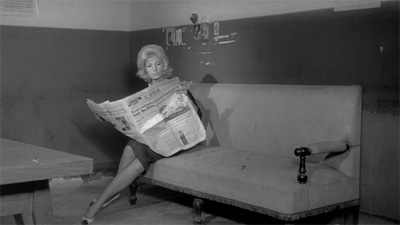I go over to The Huffington Post, a site that defines the words ‘mess’ and ‘indecipherable’ better than any dictionary could, looking for some news, and I come across a story entitled Secret Oil Rigs in Los Angeles Uncovered. ‘Ho ho!’ I thought. ‘Here’s something interesting and probably full of nasty secret pollution and damage to our health by oil companies!’ And of course I went stumbling right into the fake news trap. Watch the ‘documentary’ above. Notice how the young fellow doing the talking and walking is dressed kind of down with his jeans and boots. Notice how the camera has a tendency to swoop to his feet. To show the boots. A lot. The documentary, which purports to uncover the hidden oil rigs pumping crude from underneath Los Angeles, is presented on Huffington as being by Palladium Boots. Unless you click on the link, you don’t realize that Palladium Boots is not the name of a fantastic little production outfit making cool films, but rather a boot company selling… boots.
So now we’ve got a major news and political opinion site putting up an article that looks like news about hidden oil wells in an urban center, but is really an advertisement. The implication is that we are going to see the documentary confront issues surrounding these wells. Issues like how many children would die if one of these things blew up next to their schoolyard. Or how many people each year will get cancer because of oil wells nextdoor. Instead we get a guy tramping around LA asking insipid non-questions and only hinting at darker possibilities. We get a smattering of LA history and a lot of amazement at how well-hidden the wells are. Frankly, if you’re in LA for more than 48 hours and don’t know about the wells, you are hopefully just passing through on your way to Orange County. The real problem here is that a film produced as a corporate advertisement cannot confront real issues because the producers don’t want to create any real disturbance. So they dodge all the important questions. You’d think, after watching this ad, that oil drilling in LA is something just dandy. Wonderful! They’re pumping oil from under junior’s school! Lovely! We’re all better off for it!
But we’re just watching a boot commercial. That’s it. It’s not a cool citizen news report or hip internet filmmaking. It’s just a company hawking its crappy boots to nitwits who think they are learning something. A simple illustration of why this is so bad is to imagine your reaction if you found out that I had been paid by this boot company to write this very blog post. You would never trust me again. So what does that tell us about the Huffington Post site?
A smarter idea for this fake-news documentary would be to film a barefoot reporter who walks into the oil company executive’s office and politely asks him if he’d like to sit his own children down next to an oil well for a few years to see if they drop dead of cancer. When thrown out of the oil company’s offices, the barefoot reporter would stagger down the street begging for a pair of shoes. He’d end up with a pair of pink stilettos that fit him perfectly. Just like Cinderella.
That would be my fake-news commercial.
 The Auteurs (
The Auteurs (